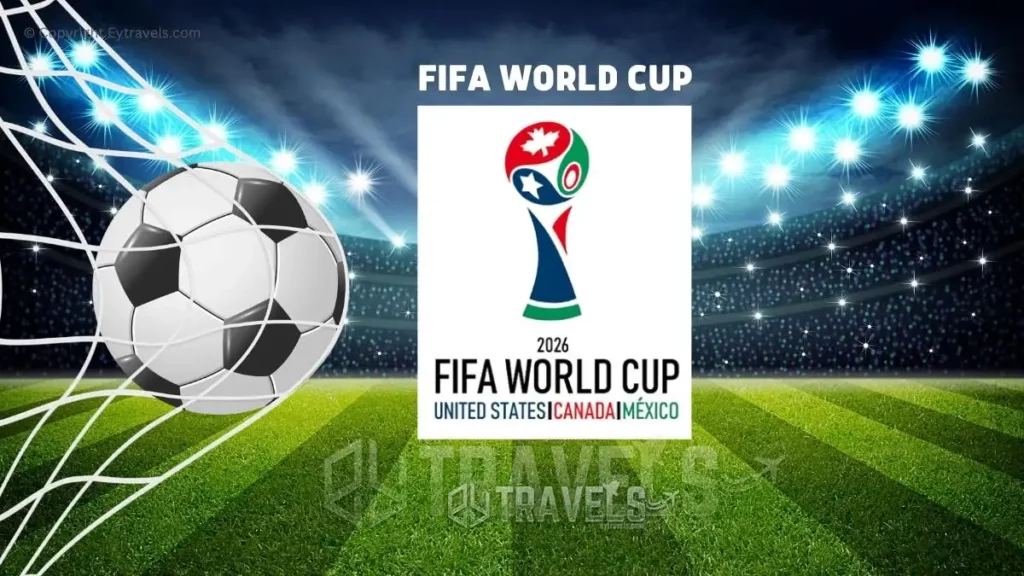FIFA World Cup 2026 Stadiums: Architectural Marvels and Sporting Legacies
The FIFA World Cup is not just a football tournament; it is a global spectacle that brings nations together, and at the heart of this grand event are the stadiums that host the matches. In 2026, the world will witness a celebration of football like never before. This article delves into the world of FIFA World Cup 2026 stadiums, exploring their selection process, sustainable design, technological advancements, iconic venues, underdog stadiums, economic impact, and their lasting legacies.
The FIFA World Cup is the most prestigious tournament in international soccer, bringing together the best teams from around the globe to compete for the title of world champion. In 2026, the tournament will be held in the United States, Canada, and Mexico, marking the first time it will be hosted by three countries and the first World Cup with 48 teams.
FIFA World Cup 2026 Stadiums

The selection of stadiums for the FIFA World Cup 2026 is a crucial aspect of the tournament, as these venues will not only serve as the battlegrounds for the matches but also as the focal points for fans and the global audience. This article will explore the stadiums chosen for the tournament, their key features, and their significance in the overall World Cup experience.
FIFA World Cup 2026 Overview
The FIFA World Cup 2026 will be a historic event, with an expanded format featuring 48 teams, up from the current 32. This change will allow more countries to participate in the tournament, increasing the level of competition and the global reach of the event. The joint hosting by the United States, Canada, and Mexico is another first for the World Cup, showcasing the unity and cooperation between these North American nations.
The FIFA World Cup 2026 is scheduled to start on Thursday, June 11, 2026, and it will run until Sunday, July 19, 2026.
Stadium Selection Process
FIFA has specific requirements for host cities and stadiums, ensuring that the venues meet the necessary standards for safety, capacity, and infrastructure. The selection process for the FIFA World Cup 2026 stadiums involved a thorough evaluation of potential host cities and their proposed venues, taking into account factors such as transportation, accommodation, and fan experience. The final selection of stadiums was based on a combination of these factors, as well as the overall vision for the tournament and its legacy.
United States Stadiums
The United States will be the primary host country for the FIFA World Cup 2026, with 17 stadiums selected to host matches. These stadiums represent a diverse range of locations, from major cities like New York and Los Angeles to smaller markets like Nashville and Cincinnati. Each stadium has its own unique features and capacities, providing a variety of experiences for fans and players alike.
| Stadium Name | Location | Capacity | Surface | Roof Type |
|---|---|---|---|---|
| AT&T Stadium | Arlington, Texas | 105,000 | Artificial turf | Retractable |
| CenturyLink Field | Seattle, Washington | 72,000 | Artificial turf | Open |
| FedExField | Landover, Maryland | 82,000 | Grass | Open |
| Gillette Stadium | Foxborough, Massachusetts | 65,878 | Artificial turf | Open |
| Hard Rock Stadium | Miami Gardens, Florida | 64,767 | Grass | Retractable |
| Levi's Stadium | Santa Clara, California | 68,500 | Grass | Open |
| Lincoln Financial Field | Philadelphia, Pennsylvania | 69,176 | Grass | Open |
| Los Angeles Memorial Coliseum | Los Angeles, California | 77,500 | Grass | Open |
| Mercedes-Benz Stadium | Atlanta, Georgia | 71,000 | Artificial turf | Retractable |
| MetLife Stadium | East Rutherford, New Jersey | 82,500 | Artificial turf | Retractable |
| NRG Stadium | Houston, Texas | 72,220 | Artificial turf | Retractable |
| Rose Bowl | Pasadena, California | 90,888 | Grass | Open |
| Soldier Field | Chicago, Illinois | 61,500 | Grass | Open |
| SoFi Stadium | Inglewood, California | 70,240 | Artificial turf | Retractable |
| State Farm Stadium | Glendale, Arizona | 63,400 | Grass | Retractable |
| Camping World Stadium | Orlando, Florida | 65,000 | Grass | Open |
| Nissan Stadium | Nashville, Tennessee | 69,143 | Grass | Open |
Canada Stadiums
Canada, as one of the three host countries, will have three stadiums for the FIFA World Cup 2026. These venues, located in Edmonton, Montreal, and Toronto, will showcase the country's passion for soccer and its commitment to hosting a world-class tournament. The stadiums in Canada will offer a mix of modern amenities and traditional Canadian hospitality, creating a memorable experience for all who attend.
| Stadium Name | Location | Capacity | Surface | Roof Type |
|---|---|---|---|---|
| Commonwealth Stadium | Edmonton, Alberta | 56,302 | Artificial turf | Open |
| Olympic Stadium | Montreal, Quebec | 61,004 | Artificial turf | Retractable |
| BMO Field | Toronto, Ontario | 30,000 | Grass | Open |
Mexico Stadiums
Mexico, with its rich soccer history and passionate fan base, will also have three stadiums for the FIFA World Cup 2026. These venues, located in Guadalajara, Mexico City, and Monterrey, will provide a unique atmosphere for the matches, with a combination of traditional Mexican culture and modern amenities. The stadiums in Mexico will be a testament to the country's love for the sport and its ability to host major international events.
| Stadium Name | Location | Capacity | Surface | Roof Type |
|---|---|---|---|---|
| Azteca Stadium | Mexico City | 87,523 | Grass | Open |
| Estadio BBVA | Monterrey | 53,500 | Grass | Retractable |
| Estadio Akron | Guadalajara | 49,850 | Grass | Open |
World Cup Stadiums' Legacy and Sustainability
One of the key considerations in the selection of FIFA World Cup 2026 stadiums was their post-tournament use and sustainability. The host countries have committed to repurposing the venues for various purposes, such as hosting other sporting events, concerts, and community activities. Additionally, the stadiums will be designed and built with environmental and social impact considerations in mind, ensuring that they leave a positive legacy for the host cities and the sport of soccer.
World Cup Stadiums' Technology and Innovation
The FIFA World Cup 2026 stadiums will feature the latest in smart stadium technology, enhancing the fan experience and improving the overall efficiency of the venues. From high-speed Wi-Fi and mobile ticketing to interactive displays and augmented reality experiences, these innovations will make attending a World Cup match a truly immersive and memorable event.
Accessibility and Inclusivity
Inclusivity and accessibility are important considerations in the design and operation of the FIFA World Cup 2026 stadiums. The venues will be equipped with facilities and services to accommodate people with disabilities, ensuring that everyone can enjoy the matches and the surrounding events. In addition, the host countries will implement various fan engagement initiatives to promote inclusivity and diversity throughout the tournament.
World Cup Stadiums' Security and Safety
The safety of players and spectators is a top priority for the FIFA World Cup 2026. The host countries will work closely with local authorities and security agencies to implement comprehensive security measures, including crowd management, surveillance systems, and emergency response protocols. These efforts will ensure that the tournament is a safe and enjoyable experience for everyone involved.
Cultural and Entertainment Events
In addition to the matches themselves, the FIFA World Cup 2026 will feature a wide range of cultural and entertainment events, showcasing the host countries' rich heritage and vibrant arts scenes. Festivals, concerts, and other activities will take place throughout the tournament, providing fans with a unique opportunity to experience the local culture and create lasting memories.
Conclusion
The FIFA World Cup 2026 is set to be a groundbreaking event, with its expanded format and joint hosting by the United States, Canada, and Mexico. The selection of stadiums for the tournament is a crucial aspect of its success, as these venues will not only serve as the battlegrounds for the matches but also as the focal points for fans and the global audience.
The chosen stadiums, with their unique features and capacities, will provide a variety of experiences for players and spectators alike, creating a truly memorable World Cup.
FAQs On World Cup Stadiums 2026:
When FIFA World Cup 2026 Will Start?
The FIFA World Cup 2026 is scheduled to start on Thursday, June 11, 2026, and it will run until Sunday, July 19, 2026.
How many stadiums will host the FIFA World Cup 2026?
There will be a total of 16 stadiums hosting matches for the FIFA World Cup 2026.
Where will the final match of the FIFA World Cup 2026 be held?
The final match of the FIFA World Cup 2026 will take place at the MetLife Stadium in East Rutherford, New Jersey, USA.
Are all the stadiums newly built, or are they existing ones?
A combination of existing and newly built stadiums will be used for the FIFA World Cup 2026.
Which stadium has the largest seating capacity for the tournament?
The Los Angeles Memorial Coliseum in California, USA, will have the largest seating capacity among all stadiums hosting matches for the FIFA World Cup 2026.
Are there any sustainable features incorporated into these stadiums?
Yes, sustainability is a key focus for FIFA World Cup 2026 stadiums, with features such as solar panels, rainwater harvesting systems, and energy-efficient designs being implemented.
Will there be any unique architectural elements in these stadiums?
Each stadium will have its own unique architectural design and elements that reflect both local culture and contemporary innovation.
Can visitors take guided tours of these stadiums outside of match days?
Some stadiums may offer guided tours to visitors on non-match days, allowing them to explore these architectural marvels and learn about their sporting legacies.
What happens to these stadiums after the tournament concludes?
Post-tournament plans vary for each stadium; some may continue to host sporting events while others could be repurposed for different uses within their respective communities.







Discover the awe-inspiring FIFA World Cup 2026 stadiums at EyTravels! 🏟️⚽ Explore the architectural marvels and sporting legacies that await you. Share this post to spread the excitement! Follow us for more travel updates, and like if you’re a football fan! 👍
.
.
Read it here: https://www.eytravels.com/fifa-world-cup-2026-stadiums/
.
#eytravels #WorldCup2026 #Stadiums #Football #TravelGoals #Soccer #Sports #ArchitecturalMarvels #SportingLegacies 🌍🏆